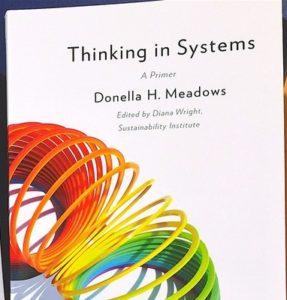Rather than teach #science by compartmentalizing biology, chemistry, physics, etc., we should focus on systems thinking.
The world is interconnected - oceans, food, #climate, energy, health, security, biodiversity & on.
When more of us, all around the world, consider how the pieces fit together & influence each other, we’ll be better equipped to meet global challenges.
Book recommendation: donellameadows.org/systems-thi… by the inspiring scholar Donella Meadows

Systems Thinking Book Sale - The Donella Meadows Project
Thinking in Systems Written by Donella Meadows and edited by Diana Wright This is a primer that brings you to a tangible world and shows you how to develop systems thinking skills.The Academy for Systems Change
Indy Richard 🏴
in reply to Sheril Kirshenbaum • • •Sheril Kirshenbaum
in reply to Indy Richard 🏴 • • •@IndyRichard Certainly. And I don’t think there should be a one-size-fits-all approach.
Incidentally, many of the great scientists I know are also painters, musicians, writers, & so on.
JMac
in reply to Sheril Kirshenbaum • • •TomGregory
in reply to Sheril Kirshenbaum • • •Daniel Betz :linux: :donor:
in reply to Sheril Kirshenbaum • • •Joseph
in reply to Sheril Kirshenbaum • • •Jon Awbrey
in reply to Sheril Kirshenbaum • • •Some thoughts ...
Conceptual Barriers to Creating Integrative Universities
• academia.edu/1266492/Conceptua…
Conceptual Barriers to Creating Integrative Universities
Jon Awbrey (org.sagepub.com)Don Nelson
in reply to Sheril Kirshenbaum • • •MEMEXIKON
in reply to Sheril Kirshenbaum • • •Kimota94
in reply to Sheril Kirshenbaum • • •Hyperyas
in reply to Sheril Kirshenbaum • • •Arun Wadhwa
in reply to Sheril Kirshenbaum • • •Rajiv Patel
in reply to Sheril Kirshenbaum • • •LucCogZest
in reply to Sheril Kirshenbaum • • •Arrakis_Surfer :antiverified:
in reply to Sheril Kirshenbaum • • •Some of us divergent types can't help but think systemically. I have presented to several groups of engineers about building innovative teams. I recommend doing deep research in a very different field, like biology (as opposed to computer science for example), when searching for inspiration. I have several good examples and love the idea of transdisciplinary thought. You have my vote.
#science #climate